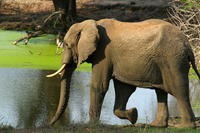South African game reserve test Elephant contraception
 Amidst recent reports about the possible culling of elephants in South Africa's Kruger National Park, comes a success story from KwaZulu-Natal’s Tembe Elephant Park where elephant contraception is being tested with success.
Amidst recent reports about the possible culling of elephants in South Africa's Kruger National Park, comes a success story from KwaZulu-Natal’s Tembe Elephant Park where elephant contraception is being tested with success.Contraception of female elephants in one South African game reserve began in June 2007, well ahead of the news this week that the government has put culling back on the table.
The birth control method, developed over 10 years, hopes to slow down elephant growth rate to prevent having to use culling to reduce numbers.
In 1995 pressure from the conservation and tourism lobby around the world forced the SA government to put a moratorium on culling in Kruger National Park.
But since then there has been growing concern in many South African game reserves that elephant populations are having a visible impact on the land, thereby threatening biodiversity. Some scientists believe there are too many elephants, some don’t.
Environmental Affairs and Tourism Minister Marthinus van Schalkwyk has released the Norms and Standards on Elephant Management, drawn up after lengthy and wide scientific and public consultations.
This identifies culling as a last resort to reduce elephant numbers but recognises intense public emotions surrounding the issue.
Only when all other options like translocation, Transfrontier Conservation Areas and contraception have been exhausted will culling get the legal go-ahead.
Meanwhile contraception is being tested in KwaZulu-Natal’s Tembe Elephant Park, a 30 000 hectare (70,000 acre) game reserve on the KwaZulu-Natal Province , South Africa border with Mozambique. It contains rare sand forest habitat, home to the rare antelope species, the suni, and about 220 elephants.
These are the only indigenous elephant in the province and very large in size and have magnificent tusks. Many of the older bulls are estimated to weigh over 7000 kg ( 15400 lb ) and are considered to be the largest elephant in the world. They are part of the vast herds that once migrated between the two countries before South African conservation authorities fenced the border in 1989.
This was because some elephants were displaying visible wounds from the civil war in Mozambique.
So some elephants were confined to Tembe Elephant Park, where they have flourished, the others, about 350 now, in the Maputo Elephant Reserve in Mozambique.
Contraception was recently identified as a viable option to slow down the growth rate of elephants in Tembe. Henk Bertschinger, Emeritus Professor of wildlife reproduction in the Veterinary faculty of the University of Pretoria at Onderstepoort was involved.
He has done more than 10 years’ research in elephant contraception using a vaccine that inhibits sperm from entering the egg. It can be continued indefinitely with boosters but is reversible. Currently 80 cows in Tembe have received boosters following last year’s initial vaccine. They are being closely monitored.
Another ongoing initiative is the proposed expansion of Tembe into southern Mozambique through the Futi Corridor to link with the Maputo Elephant Reserve. The neighbouring Tembe Tribe , after who the National Park is named, gave some of their lands to create Tembe Elephant Park in 1983 are also willing to put more land to the east and south-west of the park under conservation.
In addition, a portion of Tembe Elephant Park has been fenced off from elephants in order to preserve the sand forest - and the suni.
Says Ezemvelo KwaZulu-Natal’s resident ecologist Wayne Matthews: “The dream is to have more space for elephants. We are all trying to work on that. Contraception is a “holding pattern” before this. We very much hope we do not have to go the culling route before elephant habitat is expanded.”
Web Cam: Elecam.org
Web Site: Tembe.co.za
Transfrontier Parks: Peaceparks.org
Conservation Authority: Kznwildlife.com

